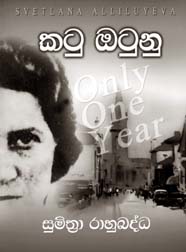|
observer |
|
|
|
|
|
OTHER LINKS |

|

|

|
Throne with thorns
"Katu Otunu" is a complete translation of the popular book entitled "Only One Year" of Svetlana Alliluyeva or Svetlana Stalina. She was the only daughter of Joseph Stalin, the Soviet dictator. Sumithra Rahubadda has done an excellent translation of this popular work into Sinhala. Undoubtedly, "Only One Year" made great strides in sales and recognition in America, India, England, Australia, Canada, France and Germany. It is an admixture of life in Soviet Russia and in the Free West. To Svetlana, her father's running of the Russian Communist empire after V. I. Lenin's death was characteristic of negation of democracy, genuine Marxism together with a vicious introduction of terror, sanguinary excesses and untold miseries for Russians inclusive of intellectuals, artists, writers and scientists. Sumithra Rahubadda in her lucid translation vividly exposits these concepts. For our understanding, Svetlana's thinking is presented as follows: (1). A critical exposition of Joseph Stalin's dictatorial regime, (2). first experience of freedom enjoyed in India and (3). an appreciation of freedom in the West together with an evaluation of social, political and cultural environments. Sumithra Rahubadda, the translator, appropriately begins Svetlana's critique of her father's Soviet Russia as follows: "My whole life, basically grief-stricken, is spent on the state's necessities. I attempted to be a human person, and certainly not an element in 'state property'. But I am not successful in this endeavour" (p.12). This thought primarily dominated Svetlana, a few hours before her departure from Moscow to New Delhi, India. This journey was intended to carry ashes of her third husband, Brajesh Suigh, to be watered down in the river Ganges. It was meditated highly that Svetlana would not be given Soviet exit visa to India for this Hindu cultural purpose by the Kremlin authorities in Moscow. She was lucky however that Stalin's death in 1953 brought about a sort of flexibility under Prime Ministers Kosigin and Nikita Krushev. On the other hand the Kremlin could not have brushed off the Indian diplomacy which played a key role with regard to Svetlana's visit to India. Throughout the book, a vivid critique of key concepts in Marxism together with the harsh and cruel methods adopted by her father, Joseph Stalin, to put them into practise, is clearly manifested. Pertaining to medicine and treatment in the Soviet Union, Svetlana was very harsh. I presume that her furnished data are factually correct. She added a sense of credibility to the records in this way. For instance, though medicare was free, a given Russian is entrusted with a given doctor during one's whole life, illness being immaterial. "No change of doctors," is the decree (p.56). In addition to medicare, doctors were expected to attend multifarious meetings in political circles, drawing up papers, reports and lists. Characteristically these are non-medical. The valuable time doctors could utilise for their care and comfort of patients was also lost. Her third husband, Brajesh Singh, an Indian Communist, was hospitalized and died there subsequently. On p.59 Svatlana noted what Brajesh Singh said: "If I be able to reach India before my death, I shall resign from the Indian Communist party." Once she arrived in New Delhi,the Soviet ambassador advised her to be away from Fascists and Fascist instigators. Svatlana commented in journalistic style: "We Russians are a very special kind of creatures. We are scared of everything. Fascism is not a threat here because there is no Fascism in India." (p.85). Our attention is drawn to corrupt Soviet officialdom which was unfolded by her father. Within this officialdom, artificial norms were manifested and were made superior to scientific norms. There was an important difference here. But the officials failed to make this significant distinction. Hence they were but slaves to artificial norms and went to the extent of evaluating scientic laws as based on wrong nations. Svatlana's discourse proved her point by noting how Mendelism, a serious scientific thought was made a mockery (P.413). She was also of the view that the socialistic experiments in Indian Villages - economics as fruitless ones (p.171). Though her Indian friends esteemed high of the discourse enveloping socialism and State control, Svatlana dismissed it as a laughing stock. She carefully listened to Indian Communist' reasoning on the concept of collective farming and collective ownership but felt sorry for those who adored these antiquated concepts. This was a clear example which showed the poverty of the adopted theory of Marxism. In practice, Marxism failed to hold good. To my understanding, she touched on the key issue. So she cleverly elaborated the point: "Next I studied Marxism but also went deep into the ideologies of Karl Marx, Lenin, Engles and Stalin. Later what I gathered was that the genuine theory of Marxism has nothing much to do with the theory adopted by the Soviet Union. Economics-wise, our Socialism was State-owned Capitalism. There was a secret police, very similar to the German Gastapo of Adolf Hitler. Karl Marx would not have imagined such a situation "(P.190). Svatlana, though not a theoretician, her reasoning was very good in this area of thought, possibly because of her direct experience of Russian, activities at home was in contrast with Indian Marxists/communists. This is a valid point. To drive this home at several places in the book, she noted the harsh and cruel policies in the Soviet Union, namely, sending Russians to jails, prisons, rehabilitation camps, mental hospitals, often after summary trials. Finally it must be said that Rahubadda's lucid language and journalistic style add a sense of credibility to Svetlana Alliluyeva's memories. |









